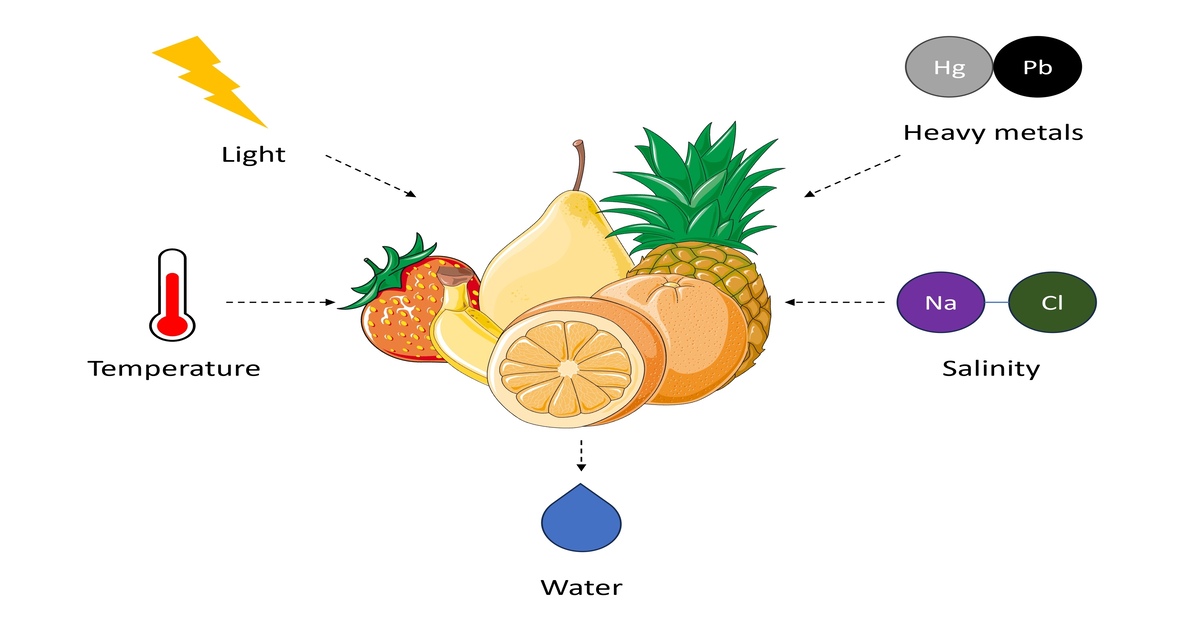Physiological, Biochemical, and Molecular Mechanisms of Abiotic Stress Tolerance in Fruits
A special issue of Agronomy (ISSN 2073-4395). This special issue belongs to the section "Horticultural and Floricultural Crops".
Deadline for manuscript submissions: 30 April 2026 | Viewed by 5981

Special Issue Editors
Interests: molecular regulation of plant growth and development; postharvest biology and fruit ripening; molecular engineering of fruits to enhance quality attributes; modulating heat stress to enhance crop productivity; production of vaccines in plants
Special Issues, Collections and Topics in MDPI journals
Interests: postharvest physiology; plant molecular biology; plant physiology
Special Issues, Collections and Topics in MDPI journals
Interests: functional genomics; molecular biology; tropical fruits; postharvest biology; fruit ripening
Special Issue Information
Dear Colleagues,
Fruits face a range of abiotic stresses during production, postharvest handling, storage and distribution. Abiotic stress such as salinity, drought, extreme temperatures, nutrient deficiencies and exposure to heavy metals can significantly reduce both fruit productivity and quality. Enhancing the ability of fruits to tolerate these stresses is crucial for maintaining high yields in challenging conditions. In this regard, fruits have evolved various adaptive mechanisms at the physiological, biochemical and molecular levels to mitigate the impact of these stresses.
A deeper understanding of how these mechanisms function and interact is essential for developing strategies to improve stress-tolerant fruit crops. Recent research advances have provided valuable insights into the complex processes that allow fruits to survive under adverse conditions. This includes the identification of stress-responsive genes, proteins and metabolites, as well as the role of signaling pathways in stress adaptation.
This Special Issue will explore both fundamental and applied aspects of stress tolerance, covering topics such as physiological responses, enzymatic activity, gene expression, functional genomics, molecular networks and innovative approaches to enhancing abiotic stress tolerance in fruits. All original research papers and reviews are welcome for submission to this Special Issue.
Prof. Dr. Avtar K. Handa
Prof. Dr. Martín-Ernesto Tiznado-Hernández
Guest Editors
Prof. Dr. Guillermo Berumen-Varela
Guest Editor Assistant
Manuscript Submission Information
Manuscripts should be submitted online at www.mdpi.com by registering and logging in to this website. Once you are registered, click here to go to the submission form. Manuscripts can be submitted until the deadline. All submissions that pass pre-check are peer-reviewed. Accepted papers will be published continuously in the journal (as soon as accepted) and will be listed together on the special issue website. Research articles, review articles as well as short communications are invited. For planned papers, a title and short abstract (about 250 words) can be sent to the Editorial Office for assessment.
Submitted manuscripts should not have been published previously, nor be under consideration for publication elsewhere (except conference proceedings papers). All manuscripts are thoroughly refereed through a single-blind peer-review process. A guide for authors and other relevant information for submission of manuscripts is available on the Instructions for Authors page. Agronomy is an international peer-reviewed open access semimonthly journal published by MDPI.
Please visit the Instructions for Authors page before submitting a manuscript. The Article Processing Charge (APC) for publication in this open access journal is 2600 CHF (Swiss Francs). Submitted papers should be well formatted and use good English. Authors may use MDPI's English editing service prior to publication or during author revisions.
Keywords
- crop
- enzyme activity
- fruit quality
- functional genomics
- genome editing
- molecular mechanisms
- omics
- stress tolerance
- transgenics
- transcriptomics
Benefits of Publishing in a Special Issue
- Ease of navigation: Grouping papers by topic helps scholars navigate broad scope journals more efficiently.
- Greater discoverability: Special Issues support the reach and impact of scientific research. Articles in Special Issues are more discoverable and cited more frequently.
- Expansion of research network: Special Issues facilitate connections among authors, fostering scientific collaborations.
- External promotion: Articles in Special Issues are often promoted through the journal's social media, increasing their visibility.
- Reprint: MDPI Books provides the opportunity to republish successful Special Issues in book format, both online and in print.
Further information on MDPI's Special Issue policies can be found here.







